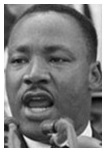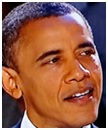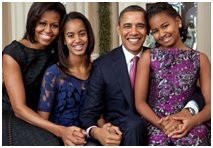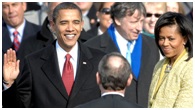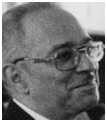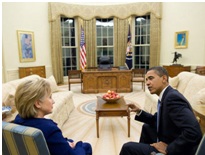|
 |
|
 |
|
|
||
Barack Obama Leadership
Barack Obama (1961- )
The first African American president (pictured right). Winner of the Nobel Peace Prize in 2009. His popularity has fallen since his re-election in 2012, partly due to his controversial health care reforms (helping poorer Americans) .
What is his leadership based on?
1. Vision In his Inaugural Address he said his vision for America requires “a new era of
responsibility” in which everyone must work hard to overcome its problems. Deeply affected by the African American struggle for civil rights, his ideals are justice and morality reflected in his favourite things:
2. Communication Telegenic, eloquent and charismatic, he communicates his vision and policies brilliantly. His winning slogan for the presidency was simply “Yes we can”.
3. Empowerment and motivation Obama realizes he can’t do anything without the American people. So his presidential campaigns gained people’s support via the Internet and an army of
volunteers. Obama (pictured right in the 2012 presidential election) gets the best from people through:
4. Character Obama is a:
But he doesn’t let dogma and ideology stop him doing the right thing (see point 5). Obama:
Obama has been driven to fulfil his father’s expectations and make up for his mistakes.
5. Pragmatic He wants government that is driven not by ideology but by finding practical solutions to problems like the economy, terrorism and climate change. He said in his First Inaugural Address (pictured with his wife Michelle at the inauguration in 2009): “The question we ask today is not whether our government is too big or too small but whether it works”
6. Constant learning He learnt about people’s problems as a young community worker in the poor South Side of
Chicago, where his wife, Michelle, grew up. He is also a great listener, learning from others (particularly Michelle, his advisers, other politicians and friends like Oprah Winfrey ,pictured right in 2009). He has also been deeply affected by his Christian faith and his minister in Chicago, Jeremiah Wright (pictured right below), who coined the phrase “the audacity of hope” that became the title of Obama’s book. He also learns from: a) quiet reflection. b) constructive debate. c) mistakes and failures (including his disastrous attempt to become a Congressman in 1999 when he was seen as “elitist”).
7. Unity of purpose He is determined to unite America. Like his hero, Abraham Lincoln (pictured right), Obama: a) called for “a divided house to stand together” b) included in his Cabinet his biggest political rival, Hilary Clinton .
8. Competence He has a brilliant intellect (studying law at Harvard, where Michelle also went). The sharpness of his mind is helped by at least one hour’s daily exercise in the gym. He also manages his time really well, prioritizing the big issues, his family and quiet reflection.
9. Strategist Obama (pictured right in his Oval Office with Hilary Clinton) has not only attention to detail but also the ability to see the overall strategy. Once he has worked out a strategy he sticks with it (as with his health care reforms) until circumstances dictate otherwise. He has learned that his policies may have to be modified to gain maximum support (like his plans to fight climate change).
10. Tough but empathetic Helped by his enormous self-belief, confidence and willpower, he is tough enough to:
But he is also sensitive to other people’s needs, guided by his mother’s (pictured right) principle: ‘how would that make you feel?’
Key quotes on America The audacity of hope! In the end that is God’s greatest gift to us, the bedrock of this nation. The true strength of our nation comes...from the power of our ideals: democracy, liberty, opportunity and unyielding hope. There’s not a black America and a white America...there’s the United States of America
Key quote on success It’s only when you hitch your wagon to something larger than yourself that you realize your true potential
Key quote on happiness Focusing your life solely on making a buck shows a poverty of ambition, it asks too little of yourself. And it will leave you unfulfilled.
Key quote on change Change will not come if we wait for some other person or some other time. We are the ones we’ve been waiting for. We are the change that we seek.
Key quote on influencing people Greatness is never a given. It must be earned.
Key quote on society Society has a responsibility to give people the tools they need to succeed. We have a stake in one another...what binds us together is greater than what drives us apart.
Key quote on climate change We will respond to the threat of climate change, knowing that the failure to do so would betray our children and future generations (Second Inaugural Address, 2013) |
|
|
||
|
|
||
| Copyright © wisdomtowin.com 2025 All Rights Reserved | ||
|




